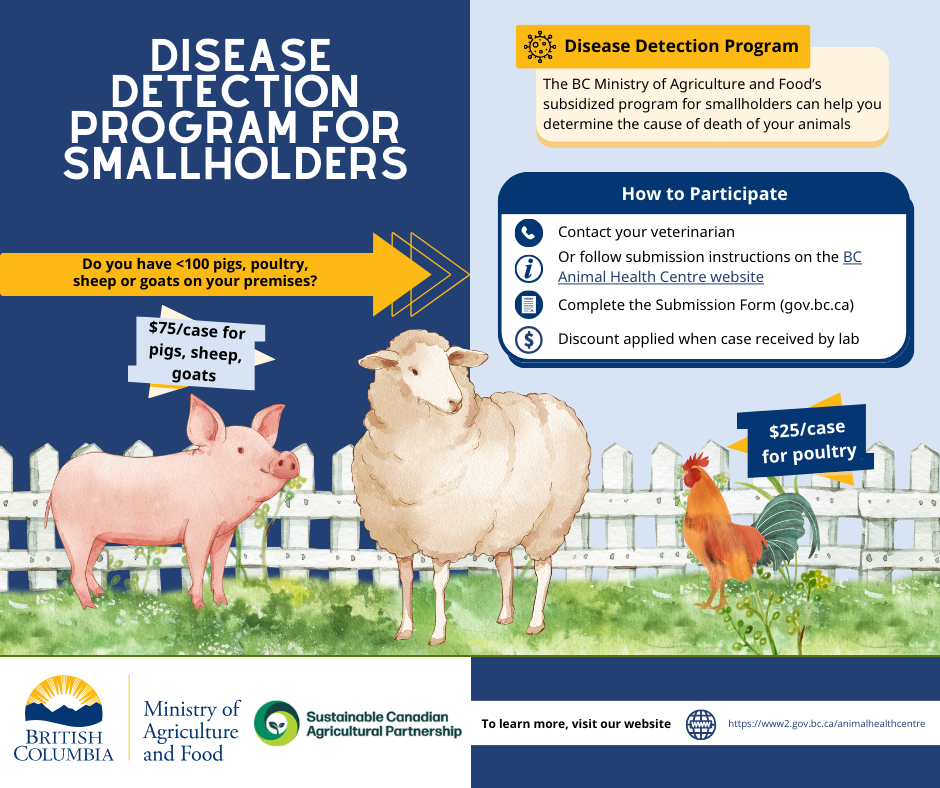Provincial programs for disease surveillance and management in domestic animals
The Province deploys programs to understand and reduce the impacts of diseases in domestic animals. Currently, programs are in place for:
- Avian Influenza
- Salmonella Dublin in dairy cattle
- Disease diagnosis in smallholder pigs, sheep, goats and poultry
- Increasing access to veterinary services for food animals
Avian influenza monitoring in wild birds and wetland sediment
BC monitors avian influenza (AI) in wildlife and wetland sediment in order to assess impacts on wildlife and risk to domestic animals and people. This program, called the B.C. Wildlife AI Surveillance Program (BC WASP), is a collaboration of the ministries of Agriculture and Food, Forests, the B.C. Centre for Disease Control, and the Canadian Wildlife Service. View data on the
BC HPAI Surveillance Dashboard
Salmonella Dublin management in dairy cattle
Salmonella Dublin (S. Dublin) is a bacteria that has significant negative impacts on the health, welfare, and productivity of dairy cattle. It can cause calf loss, abortion, and reduced milk yield. It is very hard to eliminate S. Dublin once it enters the herd. Some cattle can shed the bacteria for life.
The Province, with industry collaboration and consultation, manages the Salmonella Dublin Investigation and Management Program (SDIMP) in order to:
- Understand how many farms are infected with S. Dublin in BC and to identify risk factors for infection
- Develop resources that strengthen producer and veterinarian capacity to prevent and mitigate S. Dublin
The program includes voluntary, quarterly screening of bulk tank milk for the presence of S. Dublin antibodies (a marker of herd infection status). Results are summarized in quarterly reports:
- Quarterly Report 1 – March 2024 (PDF 692, KB)
- Quarterly Report 2 - August 2024 (PDF, 734 KB)
- Quarterly Report 3 - October 2024 (PDF, 536 KB)
- Quarterly Report 4 – January 2025 (PDF, 570 KB)
- Quarterly Report 5 – April 2025 (PDF, 575 KB)
- Quarterly Report 6 – July 2025 (PDF, 606 KB)
- Quarterly Report 7 – October 2025 (PDF, 569 KB)
- Quarterly Report 8 – January 2026 (PDF, 569 KB)
Veterinarians and producers seeking to act on bulk milk testing results can find more information at:
Disease diagnosis in smallholder pigs, sheep, goats and poultry
The Province manages a program for disease diagnosis in smallholder poultry, pigs, sheep and goats in B.C. A smallholder is defined as a premises with less than 100 livestock or poultry. The purpose of the program is to support producers and their veterinarians in managing animal health, and to monitor for regulated diseases.
The program consists of two parts:
1. Subsidized diagnostic examination of smallholder cases submitted to the Animal Health Centre in Abbotsford B.C. The reduced fee ($25 per case for poultry and $75 per case for pigs, sheep and goats) is applied when the case is received by the laboratory with a complete submission form:
2. Subsidized shipping for smallholder cases for veterinary practices outside of the Fraser Valley
Eligible cases include whole carcasses up to 40kg and portions cases. For carcasses over 40kg, veterinary practices can contact the Animal Health Centre to discuss partially subsidized whole carcass shipping or opt to submit portions. To be eligible for discounted fees, any portions case must include the following samples:
- For pigs: a 5x5cm portion of fresh spleen and a 5x5cm portion of fresh tongue
- For sheep and goats: nasopharyngeal swab in viral or universal transport media (preferred), or in a sterile plastic pouch, and a 5x5 cm portion of fresh tongue and an absomasal section and a fecal sample

Contact information
Do you have a question? Please contact us Monday to Friday, 8:30 am to 4:30 pm.
604-556-3003
1-800-661-9903
604-556-3010
